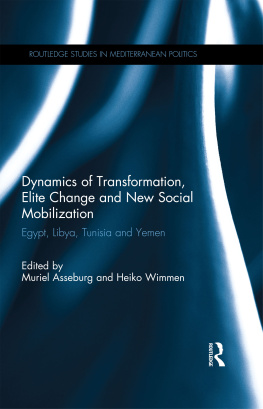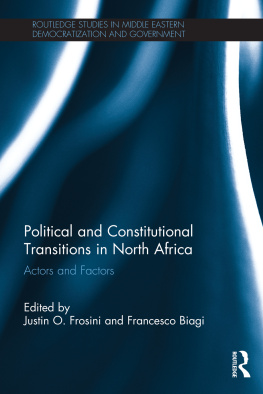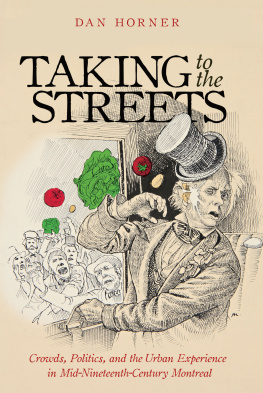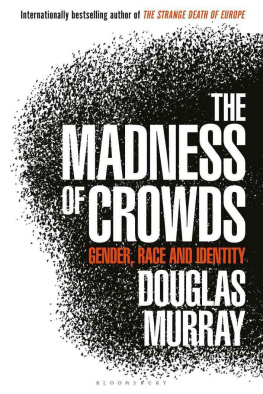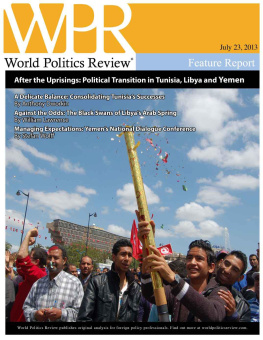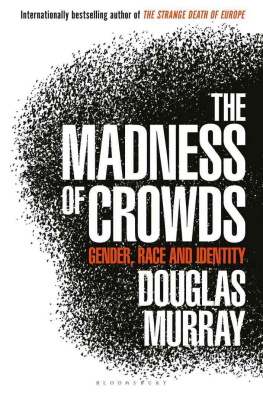Crowds and Politics in North Africa
This book takes predominant crowd theory to task, questioning received ideas about mob psychology that remain prevalent today. It is a synchronic study of crowds, crowd dynamics, and the relationships of crowds to political power in Tunisia, Libya and Algeria (201113) that has far-reaching implications embedded in its thesis.
One central theme of the book is gender, providing an in-depth look at womens participation in the recent uprisings and crowds of 201113 and the subsequent gender-related aspects of political transitions. The book also focuses on the social and political dynamics of tribalism and group belonging (asabiyya), including analysis and discussions with Libyan regional tribal chiefs, Libyan and Tunisian tribal members and citizens regarding their notions of tribal belonging. Crowd language and literature are also central to the books discussion of how crowds represent themselves, how we as observers represent crowds, and how crowds confront the language of authoritarianism and subjugation.
Crowds and Politics in North Africa includes interviews with crowd participants and key civil society actors from Tunisia, Libya and Algeria. Among these, there are numerous interviews with Benghazi residents, activists and tribal leaders. One of the original case studies in the book is the crowd dynamics during and after the attack on the US consular installation in Benghazi, Libya. The book presents interviews and fieldwork within a literary and cultural theoretical context, showing how crowds in the region resonate in forms of cultural resistance to authoritarianism. A valuable resource, this book will be of use to students and scholars with an interest in North African culture, society and politics more broadly.
Andrea Khalil is Associate Professor of Comparative Literature at Queens College, City University of New York. She has taught at the American University in Cairo (19992000), served as the Director of the Centre for Maghreb Studies in Tunis (20012) and was Fulbright Scholar Tunisia (201213). She is the author of The Arab Avant-Garde: Experiments in North African Art and Literature (2003) and the editor of North African Cinema in a Global Context: Through the Lens of Diaspora (2008).
Routledge Studies in Middle Eastern
Democratization and Government
Edited by Larbi Sadiki, University of Exeter
This series examines new ways of understanding democratization and government in the Middle East. The varied and uneven processes of change occurring in the Middle Eastern region can no longer be read and interpreted solely through the prism of Euro-American transitology. Seeking to frame critical parameters in light of these new horizons, this series instigates reinterpretations of democracy and propagates formerly subaltern narratives of democratization. Reinvigorating discussion on how Arab and Middle Eastern peoples and societies seek good government, Routledge Studies in Middle Eastern Democratization and Government provides tests and contests of old and new assumptions.
Revolution, Revolt and Reform in North Africa: The Arab Spring and Beyond
Edited by Ricardo Ren Larmont
Informal Power in the Greater Middle East: Hidden Geographies
Edited by Luca Anceshi, Gennaro Gervasio and Andrea Teti
Crowds and Politics in North Africa: Tunisia, Algeria and Libya
Andrea Khalil
Crowds and Politics in North Africa
Tunisia, Algeria and Libya
Andrea Khalil
First published 2014
by Routledge
2 Park Square, Milton Park, Abingdon, Oxon OX14 4RN
and by Routledge
711 Third Avenue, New York, NY 10017
Routledge is an imprint of the Taylor & Francis Group, an informa business
2014 Andrea Khalil
The right of Andrea Khalil to be identified as author of this work has been asserted by her in accordance with sections 77 and 78 of the Copyright, Designs and Patents Act 1988.
All rights reserved. No part of this book may be reprinted or reproduced or utilized in any form or by any electronic, mechanical, or other means, now known or hereafter invented, including photocopying and recording, or in any information storage or retrieval system, without permission in writing from the publishers.
Trademark notice: Product or corporate names may be trademarks or registered trademarks, and are used only for identification and explanation without intent to infringe.
British Library Cataloguing in Publication Data
A catalogue record for this book is available from the British Library
Library of Congress Cataloging in Publication Data
Khalil, Andrea Flores.
Crowds and politics in North Africa : Tunisia, Algeria and Libya / Andrea Khalil.
pages cm. (Routledge studies in Middle Eastern democratization and government)
Includes bibliographical references and index.
1. Political participation Africa, North Case studies. 2. Political sociology Africa, North Case studies. 3. Collective behavior- -Political aspects Africa, North- -Case studies. 4. Women Political activity Africa, North Case studies. 5. Tribes- -Political activity Africa, North- -Case studies. 6. Tunisia Politics and government 2011 7. Algeria Politics and government 1990 8. Libya Politics and government 21st century. I. Title.
JQ3198.A91K53 2014
320.961 dc23
2013036099
ISBN: 978-0-415-73987-0 (hbk)
ISBN: 978-1-315-81633-3 (ebk)
Typeset in Times New Roman
by Taylor & Francis Books
Contents
This book owes its existence to the people in Libya, Tunisia, and Algeria, who had the courage to form crowds, and to those who spoke with me, welcomed me, and guided me in traveling through the region. The book is a product of dialogues with a vast multitude of people with whom I thought, spoke, and interacted. While I was in Libya, it was an honor to be hosted by the women of the Bouod family and I thank Malak and her relatives for their profound hospitality, generosity, and protection. Thanks to my learned and generous interlocutors in Benghazi Faraj Najem, Salwa Al Daghili, Enas Eldrisi, Salmin Aljawhari, Afaf Kadiki, Ahmed Sanalla, Salah Lojli, Mohamed Suleiman Zwei, Fethi Ali Al Majbri, director of research at Garyounes University, and many others. Thanks to Emanuela Paoletti for her talks from Tripoli. During my long stays in Tunisia, countless generous people agreed to be interviewed and I thank them for their patience and trust. Particularly helpful were Samir Bouaziz and Maya Benkhaled of the Arab Institute for Human Rights, under the directorship of Abdelbasset Ben Hassan and Lamia Grar. I thank them sincerely for inviting me to join them for the field trip to Thela, where I met and listened to the residents of that city and had the opportunity to meet Ahmed Karaoud. Thanks to Emanuela Maffioli and Maher Alawami for their powerful photographs that captured many moments in Tunisia and Libya. My understanding was enriched by numerous conversations in Tunisia with Amor Boubakri, Hamadi Redissi, Mohamed Kerrou, Ilehi Mohamed (thanks for showing me your hometown Sidi Bouzid), Mourad and Katherine Ayachi, Maya Charrad, Lilia Labidi, Bochra Belhaj Hamida, Farida Labidi, and Hamadi Kaloutcha, and thanks to genius Wael Tounsi for his tech support. Thanks to the kind and steadfast people of Tataouine for hosting me through the new year of 201112, especially Ashraf Gairsen, Miriam Zrizer, Sabrine Wafi, and the entire Wafi family. In Algiers my gratitude goes to Rym and Slim Othmani for their boundless hospitality. I learned much there from conversations with Wasila Tamzali, Fares Kader Afak, Ahmed Badaoui, Samira Negrouche, Ramzi Naili, Benmerad Said, Tarek Mira, Sabrina Zouaoui, Chawki Amari, Sami Benamara, Hacen Ferhati, Adnane Bouchaib, and others. Thanks to Merzak Allouache for lunch in the Algiers casbah with the production crew filming




